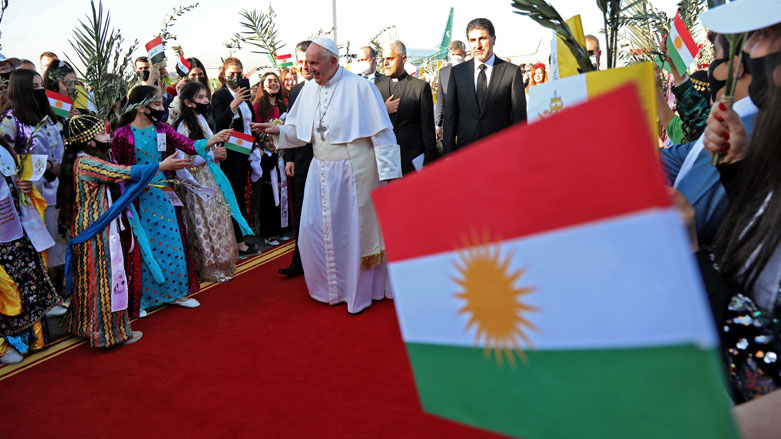US report highlights religious tolerance of Kurdistan Region
The IRF report cited repeated instances of bigotry against religious minorities in Iraq—except in the Kurdistan Region.

WASHINGTON DC, United States – On Thursday, the US State Department released its annual report on International Religious Freedom (IRF). This year, as in previous years, the report highlights the high levels of religious tolerance in the Kurdistan Region, when compared to federal Iraq.
In addition, the report makes clear that the Iranian-backed Shi’a militias in federal Iraq are of particular concern. It describes their discrimination against religious minorities, including the use of force against them.
The Kurdistan Region’s Tolerance Starts with the People Themselves
The IRF report cited repeated instances of bigotry against religious minorities in Iraq—except in the Kurdistan Region.
“There were continued reports of societal violence by sectarian armed groups across the country, except in the IKR [Iraqi Kurdistan Region],” the IRF report said. “Reports of societal violence, mainly by pro-Iran Shia militias, continued,” as “members of non-Muslim minority groups reported abductions, threats, pressure, and harassment.”
Indeed, some of those militias reportedly “operated secret prisons in which they held Sunni individuals on false accusations of ISIS affiliation,” the IRF report said.
PMF Undermines Christian Presence in Northern Iraq
There has been a significant decline in Iraq’s Christian population. In 2003, when the US-led war to oust Saddam’s regime began, around one million Christians lived in Iraq. Now the number is less than 250,000.
Among the factors contributing to this decline are the actions of Iranian-backed militias. They include militias that supposedly represent minority groups, and are composed of minority groups themselves.
However, since the militias are backed by Iran, their actions reflect Tehran’s interest. The militias seek to displace Christians in northern Iraq and populate their territory with groups sympathetic to Iran to establish a “land bridge” to the Mediterranean.
The Shabak are a predominantly Shia community of some 250,000 and are concentrated in the Ninewa Plain. The 30th Brigade is a Shabak unit of the Popular Mobilization Forces (PMF). It is aligned with Iran, and it is notorious for its abuse of power.
“Christian religious leaders continued to publicly accuse the 30th Brigade of verbal harassment of Christians in Bartella and elsewhere in Hamdaniya District of Ninewa,” the IRF report stated. The Brigade’s actions are contributing to the reluctance of Christians, who were displaced as ISIS seized northern Iraq, to return to their homes in Bartella.
Essam Behnam, the Christian head of the Hamdaniya District, “continued to resist both federal and provincial-level political pressure to issue land grants” in his Christian-majority district “to the mostly Shia families of PMF fighters who fought ISIS,” the report explained.
It also noted that the Shi’a militia, Asa’ib Ahl al-Haq, which the US has designated a terrorist organization, has established an office in Bartella.
In addition, there is an Iranian-backed Christian PMF, the 50th Brigade, but it does not represent wider Christian interests. Rather, like the Shabak 30th Brigade, it represents Tehran’s interest.
The 50th Brigade controls “the local real estate market, selling land to non-Christians from outside the district, granting questionable security approvals, and taking bribes, as well as continuing to control trade routes in the Ninewa Plain through checkpoints, forcing Christian merchants to pay bribes to gain access,” the IRF report explained.
“Restrictions on freedom of religion remained widespread outside the Iraqi Kurdistan Region,” the report said, while “Iraqi security forces (ISF) committed violence against and harassed members of minority groups.”
Institutions of Kurdistan Region Promote Religious Tolerance
Having noted the freedom of religion that exists in the Kurdistan Region, the report highlighted the various ways in which the Region’s institutions promote religious tolerance.
In contrast to the efforts of the Iranian-backed PMF to dominate Christian areas in the Ninewa Plain, the Kurdistan Regional Government (KRG) has taken the opposite stance.
“On October 4, KRG Prime Minister Masrour Barzani announced the KRG had elevated Ankawa, a predominantly Christian suburb of Erbil, to an ‘autonomous district’ of Erbil Province to allow local leaders more administrative control,” the report stated. This included “the ability to nominate civic leaders, appoint officials, and manage security.”
The report also cited two examples of how the educational system in the Kurdistan Region promotes religious tolerance.
“The Catholic University in Erbil continued to operate with full accreditation from the KRG Ministry of Higher Education and remained open to students of all faiths,” it said, noting that the University is “in the process of opening a medical school affiliated with the American University of Beirut and seeking required permission from the IKR (Iraqi Kurdistan Region).”
In addition, “minority NGO's together with the NGO Minority Alliance Network continued to hold seminars and workshops to discuss curriculum reform in IKR schools,” the report said, “recommending amendments to the current curriculum to emphasize religious minority rights.”